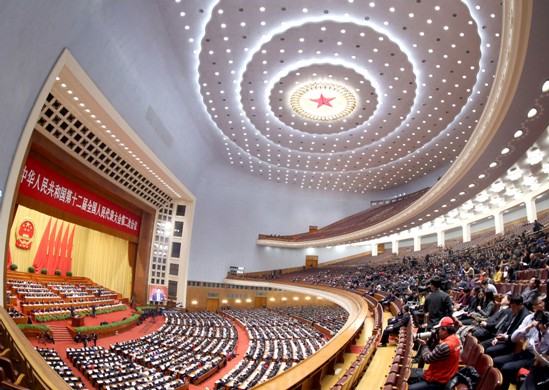Reforms clarified at NPC and CPPCC

photographed by Wang Zhou
The second session of the 12th NPC was held in Beijing on March 5, 2014.
The annual plenary meetings of China’s top consultative and legislative bodies, the Chinese People’s Political Consultative Conference (CPPCC) and the National People’s Congress (NPC), began on March 3 and March 5 respectively. Colloquially referred to as “lianghui”, or “the two meetings”, the NPC and CPPCC are both in the second session of their 12th terms.
By the time the exact date of the CPPCC was confirmed at 5:00 pm on March 2, 1,130 proposals had been submitted by CPPCC members, and 637 cases had been placed on file. This year’s proposals mainly focused on key issues such as comprehensively deepening reform and other major problems arising in the process of building the economy, government, culture, society and ecological civilization. Key topics included transforming government functions, guiding urbanization, improving environmental protection, encouraging regional economic development, and implementing reforms of educational and the medical system.
The grand blueprint for comprehensively deepening reform was drawn up in the Third Plenary Session of the 18th CPC Central Committee, held last November. During the NPC and CPPCC this year, the NPC deputies and CPPCC members will offer advice and suggestions on how to realize the grand blueprint laid out in the Third Plenum.
Deepening reforms
Comprehensively deepening reform is without doubt the general theme of the topics discussed at the NPC and CPPCC this year. 2014 also marks a pivotal year for the Twelfth Five-Year Plan. Proposals made by CPPCC members chiefly focus on reform in economics, law, education and other sectors.
One of the key areas targeted in the “Decisions” released at the end of the Third Plenum is the reform of state-owned enterprises. Xu Jiuping, dean of the Business School of Sichuan University and member of National Committee of the CPPCC, said that state-owned enterprises are the “bellwethers” of the rising Chinese economy, and a major driving force of reform and opening up. However, he expressed that there are currently some very large and complicated problems that need to be resolved.
Among the overall proposed reforms, Qing Lianbin, a professor from the Teaching and Research Department of Scientific Socialism at the Party School of the Central Committee of CPC, believes that government and market reform can together play a key role in reforming the income distribution system. Efforts to curtail lavish spending have already been felt throughout Chinese society. “Tendencies that you could call morally degraded, like offering and taking bribes and using governmental cars for private purposes, have clearly been contained,” said Professor Zhang Bin from the College of Chinese Language and Literature at Northwest Normal University.
Modernizing governance
At a seminar on “implementing the principles of the Third Plenary Session of the 18th Central Committee of CPC and comprehensively deepening reform” held in February, CPC General Secretary Xi Jinping systematically elaborated the concept, “modernizing a country’s governance system and capabilities”.
Yan Xiaofeng, director of the Research Institute of Marxism at PLA National Defense University, said “what we need to answer now is the question: what sort of system should we achieve governance modernization under?” According to Yan, modernizing national governance is the process of reforming and innovating the way a country functions based on the underlying framework of its national system, cultural traditions and the societal demands. “For modernizing national governance, the first issue is who should take the lead,” asserted Cao Yisun, a professor from China University of Political Science and Law and member of the National Committee of the CPPCC. “The leading cadres of the Party should come to realize that science, democracy and the rule of law are the souls of modernization.
To target actual social problems
Reflecting on the role scholarship will play in China’s reform process, many scholars expect that research will become more precise and accurate, targeting actual social problems.
In the NPC, Chao Ke, deputy director-general of the Bureau of Scientific Research Management of the Chinese Academy of Social Sciences (CASS) and deputy to the National People’s Congress, proposed conducting China’s Third National Language Census. He noted the flourishing of China’s economy has been paralleled by the endangerment of many aboriginal languages.
As a specialist in regional and urban studies, Sun Jiuwen, director of the Research Center for Chinese Regional Economic and Technical Cooperation, is particularly interested in the outcome of the NPC and CPPCC for policy-making regarding spaces. He expects the NPC and CPPCC to clarify further the urban and rural development policy in the process of urbanization, policy related to free trade areas and major functional areas within regions, and policy pertaining to different administrative levels, such as counties directly administered by provinces, cities and regions upgraded from counties.
Translated by Bai Le
Revised by Charles Horne
